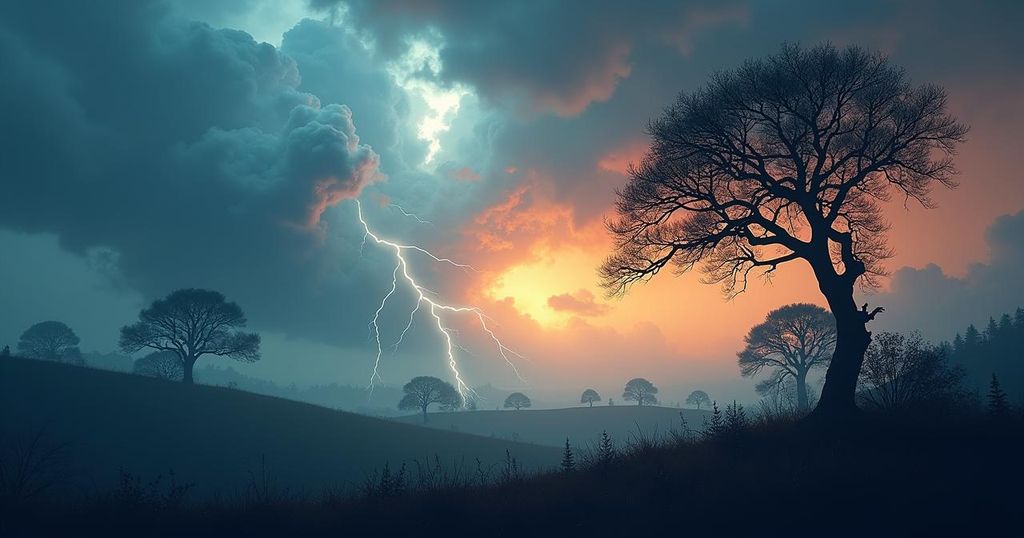The Impact of Climate Change on Natural Disasters: Insights from Meteorologists

Meteorologists are increasingly witnessing the impacts of climate change on natural disasters, as evidenced by the rapid intensification of storms in 2024, notably seen with Hurricane Milton. Respected experts like John Morales emphasize the critical need for the public to heed weather warnings. The year has been marked by severe flooding, record-breaking heatwaves, and monumental storms that underscore the urgent consequences of climate change. Ignoring these predictions poses grave risks to communities globally.
Meteorologists across the globe are currently confronting the alarming realities of climate change as they observe the intensifying nature of natural disasters firsthand. The recent surge in catastrophic weather events correlates strongly with global warming, prompting urgent attention from experts in the field. The year 2024 has been particularly severe, witnessing unprecedented natural disasters that have reshaped landscapes and caused significant loss of life and property. Notable events include extreme flash floods in the United States, Europe, and Asia, and hurricanes that have rapidly escalated into exceptionally powerful storms, leaving regions vulnerable and in dire need of recovery. Amidst this crisis, meteorologists are equipped with the tools to predict the intensity and potential devastation of upcoming storms. For instance, as Hurricane Milton approached, the state of Florida implemented mandatory evacuation orders as a precautionary measure in response to the hurricane’s rapid intensification. This situation highlights the crucial role of timely and accurate meteorological predictions. Among those conveying these critical warnings is Mr. John Morales, a highly esteemed meteorologist in South Florida. He serves as a Hurricane Specialist for the National Weather Service and has consistently voiced concerns regarding the substantial influence of climate change on extreme weather patterns. During a recent broadcast on October 7th, Mr. Morales demonstrated a poignant emotional reaction upon realizing the swift escalation of Hurricane Milton to Category 5 status. As he noted individuals should heed the warnings provided by seasoned meteorologists regarding impending disasters: “It is just an incredible, incredible, incredible hurricane. It has dropped… I apologize. This is just horrific.” Such emotional testimony from respected experts underscores the gravity of the situation and the necessity for public awareness and action. In summary, the storms and weather patterns observed in 2024 deviate starkly from historical norms, serving as unequivocal indicators of climate change’s broadening impact. It is imperative that the public remains receptive to the warnings of meteorologists regarding the increasing frequency and intensity of these natural disasters. Ignoring scientific warnings threatens lives and communities, especially as we confront a future where extreme weather may become the new standard. The escalation of climate change and the resultant weather phenomena necessitate both understanding and action from all individuals, as we face the potential for increased catastrophic events in the coming years.
The article discusses the direct impact of climate change and global warming on natural disasters, emphasizing the increase in frequency and intensity of such events in recent years. The narrative revolves around the experiences of meteorologists, particularly John Morales, who exemplifies the emotional and factual challenges associated with predicting severe weather incidents. The context focuses on the necessity of evacuations, the extraordinary development of hurricanes, and the devastating effects of climate change observed in 2024. This background establishes the urgency of responding to climate science recommendations to mitigate future disasters.
In conclusion, current climatic patterns and the rise in extreme weather events are clear manifestations of climate change. The experiences shared by meteorologists like John Morales exemplify the urgency for public understanding and responsiveness to their warnings. As we face escalating disasters, it is essential that communities take these predictions seriously to safeguard lives and property.
Original Source: www.thetravel.com








